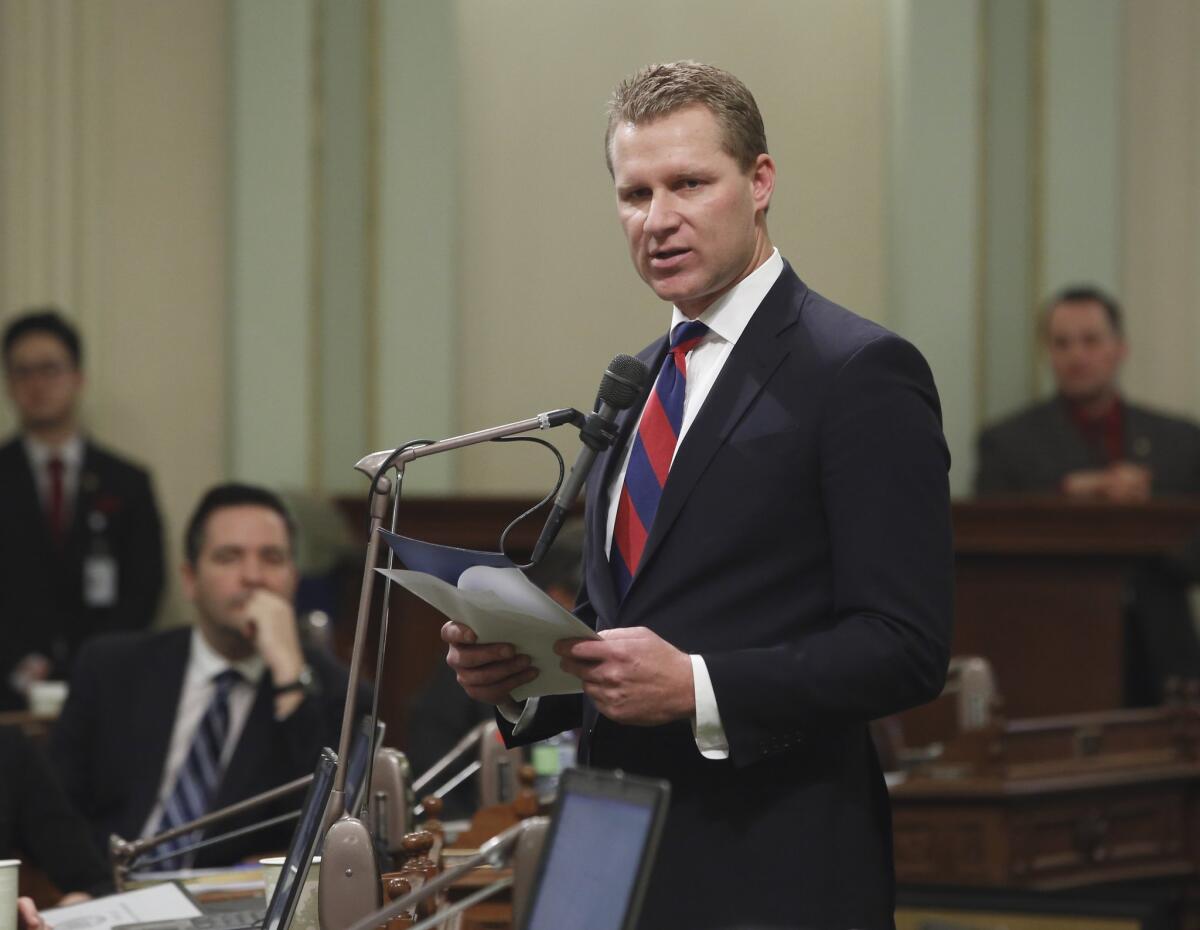Here’s what the Assembly GOP wants in negotiations for healthcare-plans tax

- Share via
Reporting from Sacramento — Assembly Republicans are bellying up to the bargaining table over Gov. Jerry Brown’s proposed tax package for healthcare plans, signaling a new phase in the negotiations that have slogged on for more than a year.
A document obtained by The Times lays out the political and policy wish list for the Assembly GOP caucus. Most significantly, they want to direct more than $800 million in spending made possible by the new tax.
The Assembly GOP is calling for $290 million to fund services for the developmentally disabled and another $120 million to reimburse certain skilled nursing facilities, which suffered major cuts in 2011. The proposal would also put money toward paying off state debts: $240 million would go toward California’s retiree healthcare liabilities for public employees and $175 million would repay transportation loans.
The plan would leave $475 million in spending at the discretion of the governor or legislative Democrats.
Republicans have largely been sidelined from dictating state spending since California switched to a majority-vote budget in 2010.
GOP support is critical for the tax plan, which would help fund Medi-Cal, the state’s healthcare program for the poor. California’s current tax on managed care organizations expires in June, and the Obama administration has said the state must overhaul the levy or risk losing federal money. Not replacing the tax would punch a $1-billion hole in the state’s budget, Brown has argued, leaving funding for social services at risk.
But GOP legislators are typically hostile to new taxes. The governor has framed the proposal as “tax reform,” coupling a series of levies on managed-care health plans with eliminating other taxes.
The Assembly GOP document echoes Brown’s framing, calling the proposal “financing reform” and noting the package as a whole would reduce commercial plans’ tax burden by $100 million.
“Throughout negotiations, Assembly Republicans have stood firm in rejecting any tax increases that would raise healthcare costs on Californians,” Assembly GOP leader Chad Mayes said in a statement.
“Our goal has been and continues to be securing [a managed care organization] MCO plan that prioritizes consumers, improves services for the developmentally disabled community and protects taxpayers by paying down state debt.”
See more of our top stories on Facebook >>
Mayes, of Yucca Valley, met with Brown on Tuesday to discuss the proposal. Gareth Lacy, a spokesman for the governor, declined to comment on the meeting.
The tax breaks have not been enough to satisfy some in the Republican base. Jon Fleischman, an activist and publisher of the conservative website the Flash Report, blasted the proposal as a tax increase and urged GOP lawmakers to “keep your commitment to taxpayers.”
Members of the Senate Republican caucus have publicly staked a harder line against the proposal than their Assembly counterparts. Senate GOP leader Jean Fuller of Bakersfield told the San Jose Mercury News last week that she is urging her members to reject what she considers to be a tax hike.
But the Assembly Republican leadership appears more inclined to strike a deal. The measure requires a two-thirds vote in each house, meaning at least three GOP votes in the Assembly and one in the Senate.
The GOP’s wish list document lays out conditions for the caucus to consider the proposal, many of which have already been met. The caucus wanted support from the health plans and promises they would not pass costs on to consumers; the California Assn. of Health Plans backed the proposal last week, and several major — including Blue Shield, Kaiser Permanente and Health Net — have said the measure would not affect affordability of their plans.
The positions of other interest groups were crucial as well: the Assembly GOP wanted the California Chamber of Commerce to support the plan (which it does, as of last week) and sought neutrality from the conservative California Taxpayers Assn. and the Howard Jarvis Taxpayers Assn.
The Jarvis group, named for the influential anti-tax crusader who championed Proposition 13, staked a neutral stance on Thursday. Jon Coupal, the organization’s president, said after analyzing the proposal, the belief is “there’s a relatively low risk of consumers taking a hit.”
CalTax has not yet taken a public position on the measure.
Finally, the Assembly GOP wants assurances that all legislative Democrats, even those in tough re-election campaigns, will vote for the measure.
Follow @melmason for more on California government and politics.
ALSO:
Revamping the tax on healthcare plans proves tougher than Brown thought
Brown’s budget set to included revised health care tax
More to Read
Sign up for Essential California
The most important California stories and recommendations in your inbox every morning.
You may occasionally receive promotional content from the Los Angeles Times.














